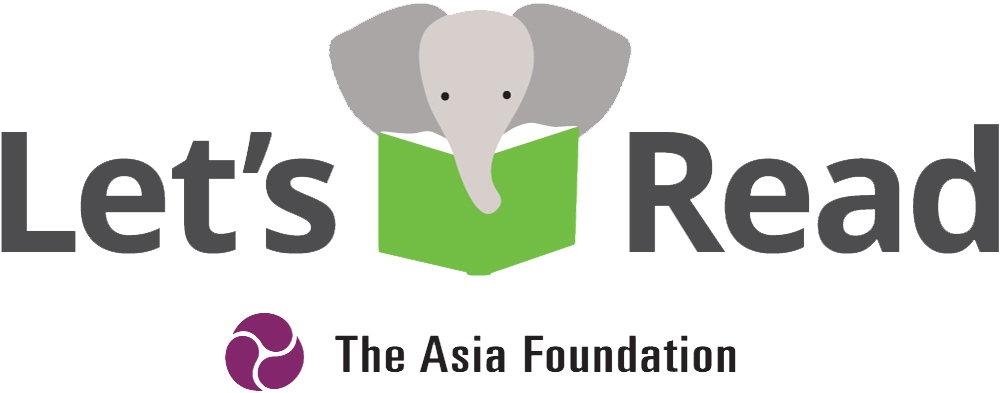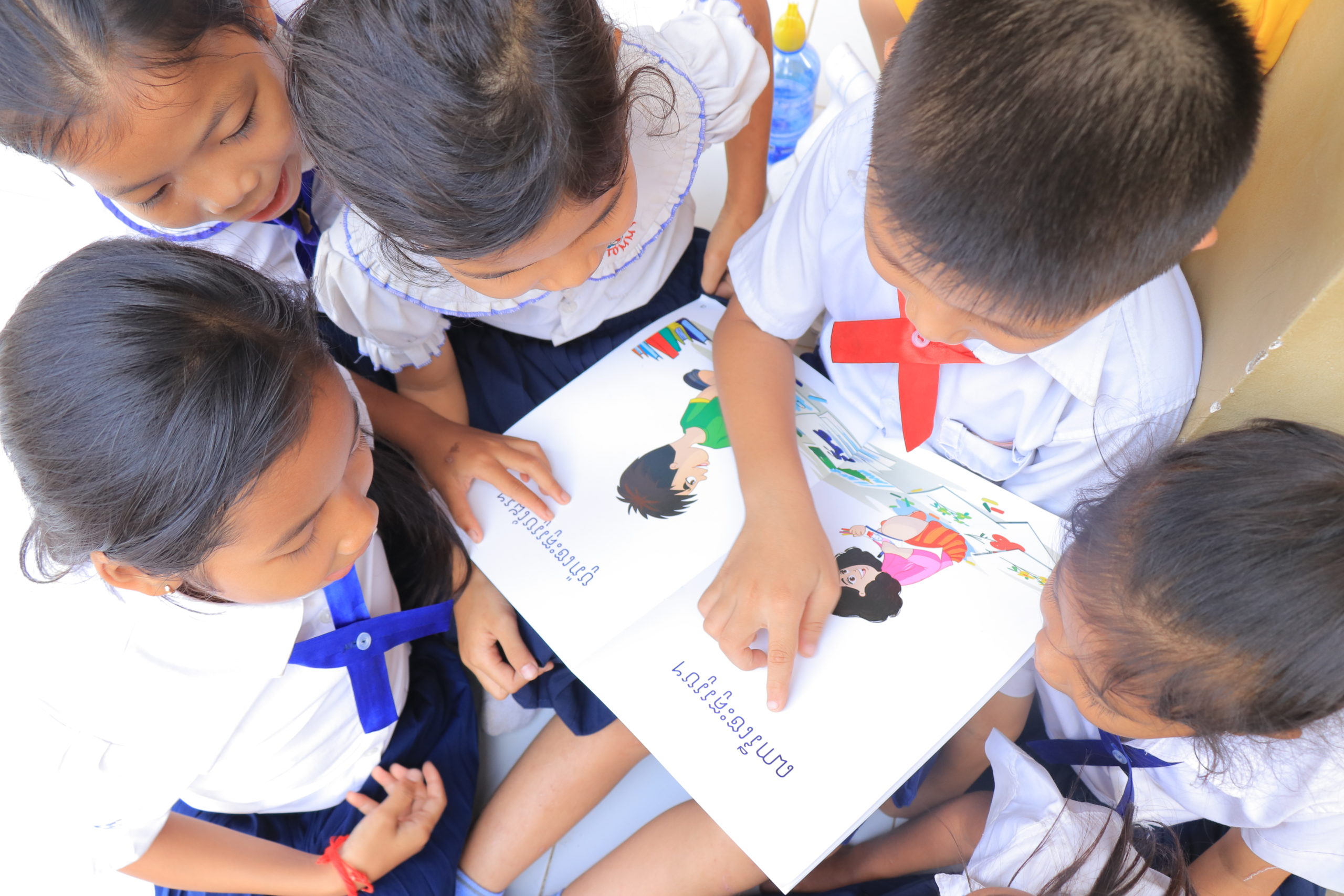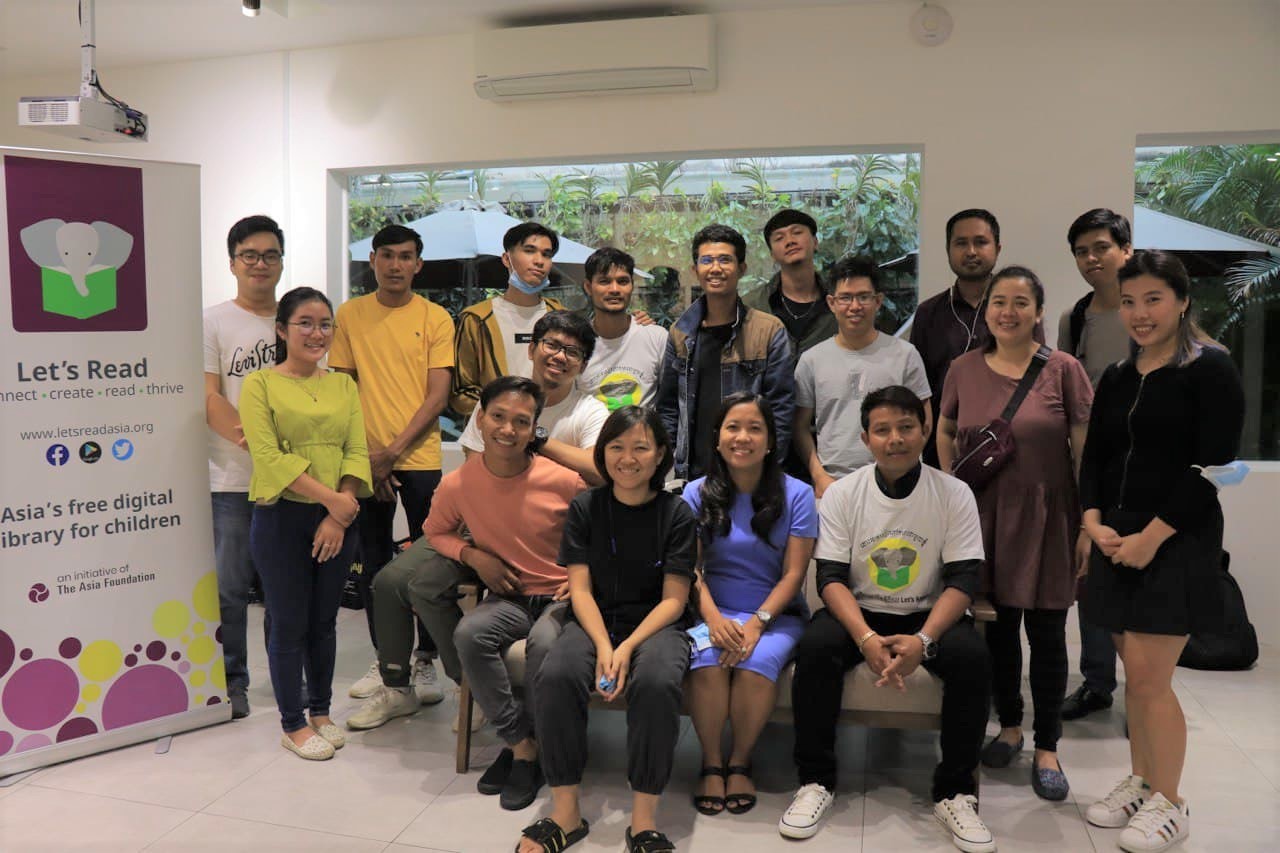
Laying Foundations: Inspiring Cambodia’s next generation of readers
While basic literacy has increased in Cambodia over the last twenty years, reading continues to be an activity restricted to the confines of the country’s classrooms and study halls. But there are some groups working to ignite a passion for literature in the Kingdom, and local content creators are key to their success

Sitting in one of Phnom Penh’s hundreds of coffee shops and cafes, you are likely to be surrounded by young people chatting, looking at smartphones, and working away on laptops.
But spotting an actual book – bound cover, ink, paper – is far less common.
Plagued by an underfunded education system, a weak publishing sector, and a general lack of interest in literature, creating a culture in Cambodia where more people read for pleasure remains a goal far off on the horizon.
Despite the task at hand, there are some groups working to instill a love of literature from a young age, building a network of local content creators to produce the children’s books that give young learners their first taste of the joys of reading in their formative years.
Kann Puthy believes in this mission of nurturing a passion for knowledge through reading and sees the lack of materials outside of school texts as a major obstacle. Today the Deputy Director of the Primary Education Department for the MoEYS, his concerns are rooted in personal experience.
“When I went to my first teaching school in 2001, the school had no library,” he said. Puthy described the thrill of discovering a lone text at a friend’s house around that time.
“I found one book – I still remember the title – Building Yourself. I read that book three or four times because I had nothing else to read.”
Sipar is one group that has been working to fill this gap in Cambodian literature for decades. Originally translating foreign texts into Khmer, in 2000 the French NGO established a publishing programme that has trained local content creators, produced over 200 titles, and printed almost 2.5 million Khmer-language books. Their efforts have also had an important impact on the local publishing landscape.
“We spent a lot of time training people, and those people became different publishers,” said Hok Sothik, Sipar’s Director, explaining the programme’s impact on the still-nascent local sector.
Heng Dary, an alumnus of Sipar’s training program and the head publisher at local company Norkor An, gained valuable knowledge and experience during her time with the Sipar, starting as an assistant librarian and eventually earning a place in the publishing program where she was inspired to start her own printing company. Since 2015, her firm has produced 12 children’s books, two young adult novels, and prints 1,000 copies of each title annually, demonstrating the long-lasting effects of Sipar efforts in Cambodia.
However, the French NGO is just one group that has accepted the challenge of increasing access to high-quality Khmer-language children’s books in the Kingdom.

This year sees the culmination of the Book Lab campaign, where local authors, illustrators, and content creators were brought together to collaborate and produce 94 original children’s books that inspire Cambodia’s next generation of readers with entertaining and educational stories. Book Lab is run by the Let’s Read project, a literacy push spearheaded by the Asia Foundation, Smart Axiata, and other key players in Cambodia.
“We want to expand the ecosystem of authors and illustrators [in Cambodia],” said Chheang Chansomey, Program Officer for the Asia Foundation. “So that the number of book creators increases, even if it is only one by one.”
Established in 2016, the BookLab events that have been an integral part of Let’s Read’s strategy draw from local talent with an open call to content creators. Participants are teamed up with experienced specialists to provide guidance and insights into the process of creating unique stories that entertain, educate, and speak to Cambodian children.
Meloney Lindberg, Cambodia’s Country Representative for the Asia Foundation, sees involving these young creatives as an essential way to get the next generation passionate about books.
“We believe by developing a larger network of children’s authors and illustrators that it will promote reading not just for schooling, but for lifelong learning, fun, and play,” she said.
Over the course of the nine BookLabs that took place between 2016 and 2020, the stories explored topics ranging from career choices and STEM learning to environmental awareness and gender equality.
At each event, new authors are linked with editors to brainstorm and have conversations about themes, storylines, and what makes for an engaging and meaningful children’s tale. Once the stories have taken form, illustrators and art directors team up to create storyboards that bring their unique style and vision to the characters and narrative.
One illustrator that answered Let’s Read’s open audition was San Samanea. With no formal training but a lifelong love of art, the 26-year-old Phnom Penh native who goes by Nea applied on a lark, just looking for an excuse to draw, and soon found herself helping create a story to entertain and educate the next generation of Cambodian bookworms.
New to the world of publishing, the event was a learning experience for Nea.
“I was lost once we finished the storyboard, I just kept asking the art director, what do I do next?” she said. “But they [the author and editor] showed us what they want and they gave me some idea of what this character is going to do and what kind of expressions they should have.”
Nea, who works part-time for a media startup, enjoyed the opportunity to use her art to bring a story to life, and while she may not be quitting her day job to pursue a career in children’s books just yet, the experience opened her eyes to the possibilities that art may hold for her future.
“After this project, I want to try to do some more art projects that are more than just a hobby. We’ll see,” she pondered.
However, Book Lab events are just one aspect of Let’s Read’s literacy work in Cambodia.
Starting In 2018, as part of the USAID-funded All Children Reading Program implemented in conjunction with Research Triangle International, the Cambodian government began its mission to distribute storybooks for 1st and 2nd-grade public school students along with their standard textbooks.
A collaborative effort, Let’s Read participated in the project, building on the success of their Book Lab model. All Children Reading has since created 60 titles to encourage young learners to read outside of the classroom and the 10,000 books printed so far demonstrate the potential for Cambodia’s pool of creative authors and illustrators to improve literacy in the country.
While the Book Lab events and All Children Reading were responsible for the creation of dozens of new titles, the Let’s Read team also recognized the time-consuming and labor-intensive nature of this type of production process. Looking to accelerate the number of books available to Cambodia’s millions of young learners, face-to-face and virtual translation events brought together volunteers as well as children’s book experts and professional translators to reproduce foreign-language titles in Khmer.
As well as bolstering Let’s Read’s library with hundreds of Khmer-language titles, the use of a digital translation platform these events also demonstrated the functionality of digital tools for collaboration, which became invaluable during the ongoing Covid pandemic.
Along with these translation events and a digital library offering access to hundreds of titles via an Android app, the group also understands the importance of establishing routine in building a culture of reading, and the Read Everyday campaign became an important part of Let’s Read’s activities.
In cooperation with the MoEYS and 12 other partners, ten videos were produced that demonstrated tips for parents and educators on how to conduct fun, engaging reading sessions that get young learners excited about books. With the goal of instilling the importance of reading out loud for young learners, the videos were distributed to teachers, librarians, and parents via social media and radio and were shared onscreen at the Institute of Technology during the National Reading Day Festival to mark the culmination of the ten-day, “Read Everyday Week” campaign. Initially, Let’s Read set a target of 100,000 children to reach for this massive literacy programme, however, by the end of the campaign in 2020 over 220,000 had been impacted.
We believe by developing a larger network of children’s authors and illustrators that it will promote reading not just for schooling, but for lifelong learning, fun, and play
Meloney Lindberg, Asia Foundation Cambodia Country Representative
With projects such as these exhibiting successes already, Asia Foundation’s Chheang Chansomey is optimistic about the future of Cambodia’s next generation of literature enthusiasts.
And her optimism seems warranted. While the 2020 physical event was cancelled due to Covid-19, the 2019 National Book Fair tripled the attendance of the 2017 fair, with almost 160,000 people – many of them young adults and children – passing through the three-day event. The number of booths exhibiting Cambodian and international books also increased from 80 in 2017 to 140 in 2019, a testament not only to the growth of the local sector but the interest of the population.
As the government and NGOs continue to work together to establish a culture of reading by getting books into the hands of young learners across the country, Let’s Read isn’t finished yet. “We are going to keep making local content and connecting with local people,” Chansomey said. “We are going to go out and work with the community more than we already have, making reading a leisure activity and not just a chore for school.”

